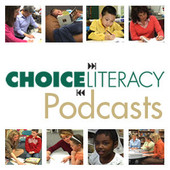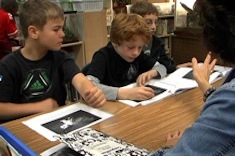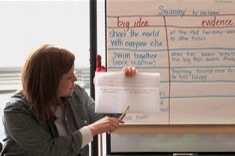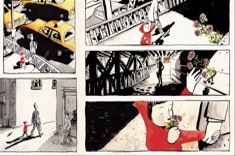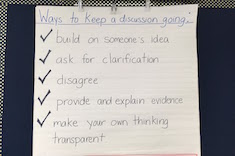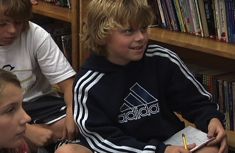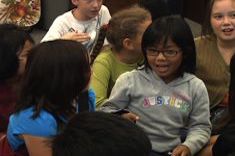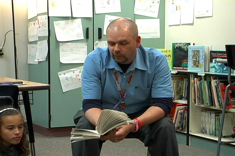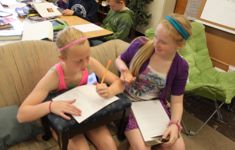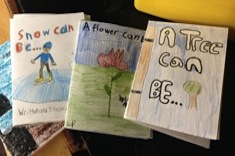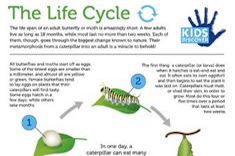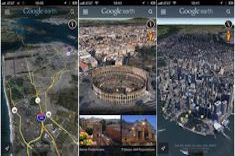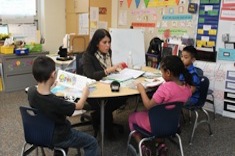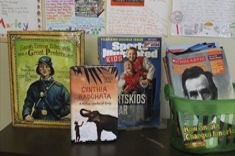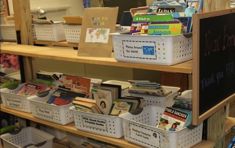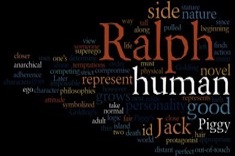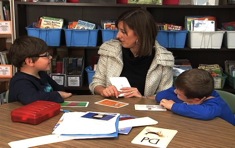Teaching Reading
Our contributors lead reading workshops in classrooms with creative flair. Over the past 12 years, we've filled our site with loads of suggestions, tools, and tips for using engaging books throughout the curriculum to hook kids on reading. Here is where you will find many stories of successful and not-so-successful workshop days, and what we learned from them. We bring these stories to life through hundreds of video examples.
Latest Content
Ralph Fletcher on Mentor Texts (PODCAST)
If you’re spending some time sifting through new books and thinking about teaching with them, you’ll enjoy this podcast with Ralph Fletcher.
Donalyn Miller on Modeling Literate Lives (PODCAST)
Donalyn Miller, author of the acclaimed bestseller The Book Whisperer, chats with Franki Sibberson about the importance of teachers modeling their literate lives for students.
The Power of Charts in the Classroom
Melanie Swider shares suggestions for making anchor charts more purposeful.
Guess Who’s Coming to Dinner?
Gretchen Schroeder finds the classic dinner party assignment is a fun way for her high school students to explore kindred spirits in literature late in the school year.
Student-Created Text Sets
Jillian Heise’s middle school students design text sets late in the school year. It’s a great activity for discovering how they have grown as readers, as well as a gift to next year’s class.
Owl Research Notes Group
Andrea Smith helps a group of boys take notes during an owl research project.
Big Idea: First-Grade Lesson
Bitsy Parks introduces her first graders to the concept of theme.
Favorite Wordless Picture Books for Teaching Inference
Jan Burkins and Kim Yaris present some of their favorite children’s books for teaching inference.
Working Hard and Reading Carefully: On Theme and Rereading
Jennifer Allen uses commercials to promote the importance of rereading to students while teaching theme.
Redefining Just-Right Books
Jan Burkins and Kim Yaris share advice for rethinking how teachers and students define “just-right” texts.
Student Learning Targets
Christy Rush-Levine finds she has to rethink learning targets for her middle school students if she wants students to pursue complex and lifelong reading goals.
Rethinking Reading Goals
Maria Caplin develops a system for helping students move beyond simple goals like noting the number of pages read.
Book Blurbs in the Middle School Classroom
Jillian Heise uses the quirky genre of book blurbs in her middle school classroom to model summaries and glean information about students’ comprehension, reading interests, and writing skills.
Whole-Class Conversations for Read Aloud Closure
Melanie Swider discovers that conversations after read alouds are a wonderful way for students to remember and retain the learning from shared texts.
Percy Jackson Read-Aloud in Fourth Grade
Tony Keefer demonstrates how he makes his read-alouds interactive, and explains why he selected Percy Jackson to use with this group of fourth graders.
Weekly Check-In Sheets
Are you finding effort from students is flagging? Katherine Sokolowski develops check-in sheets as a way to lift student energy and reflection.
Catching Up with Anna
Katie Doherty Czerwinski tackles the challenging issue of helping a student catch up in book clubs and reading workshop when they have missed a lot of class time.
Notebook Sketching: Conferring with Sarah
Aimee Buckner confers with Sarah about sketching in her notebook.
The Secret to Magical Author Visits
Prolific children’s book author Laura Purdie Salas explains why you should treat visiting authors like rock stars, with many tips and examples from her writing friends.
Integrating Paraprofessionals into Reading Workshops
Justin Stygles decides he needs to completely rethink the role of classroom aides.
Digital Status of the Class
Maria Caplin explains how a digital status sheet saves minutes every week that add up to extra hours of instructional time over the year.
Making Time for Individual Conferences
Franki Sibberson explains how longer conferences early in the year pay dividends all year long.
Infographics and the Common Core: Resources and Standards
Andrea Smith explains why infographics are more useful than ever in the age of the Common Core, and provides many links to free infographic resources on the web.
Using Google Earth to Support Readers
Justin Stygles finds Google Earth is a marvelous tool for helping students research settings in novels.
Three Questions to Ask When a Guided Reading Group Is Stuck
Jan Burkins and Kim Yaris share three questions teachers should ask themselves when guided reading groups aren’t going well.
Frog and Toad and Tina and Maya: A Precocious Kindergarten Reading Group
Suzy Kaback ponders the precociousness of two kindergarten readers.
Blurring Genres and Real-Life Readers
The line between fiction and nonfiction can be fuzzy, but Tony Keefer finds what matters most is finding texts that captivate readers.
Exploring Literary Nonfiction with Middle School Students
Holly Mueller and her middle school students have fun exploring the creative aspects of literary nonfiction.
Using Lord of the Flies to Teach Argument
Gretchen Schroeder has suggestions for using short texts and close reading to help students comprehend The Lord of the Flies.
Kindergarten Small Group: Concepts of Print
Clare Landrigan leads a "quick and frequent" small group that integrates phonemic awareness activities with assessment.
Browse Content By
Type
Category
- Assessment Tools
- Big Fresh Archives
- Booklists
- Choice Numeracy
- Classroom Design
- Common Core
- Community Building
- Conferring
- Content Literacy
- Digital Literacy
- English Language Learners
- Equity
- Family Relations
- Free Samples
- Guiding Groups
- Leadership
- Literacy Coaches
- Mentor Texts
- Minilessons
- New Teacher Mentors
- Podcasts
- Poetry
- Quote Collections
- Reading Strategies
- Self Care
- Struggling and Striving Learners
- Talking and Listening
- Teacher Study Groups
- Teaching Reading
- Teaching Writing
- Word Study and Vocabulary
Author
- Melissa Quimby
- Nawal Qarooni
- Gwen Blumberg
- Julie Cox
- The Lead Learners
- Hannah Tills
- Josie Stewart
- Ruth Metcalfe
- Mallory Messenger
- Becca Burk
- Jodie Bailey
- Vivian Chen
- Mary Brower
- Tiffany Abbott Fuller
- Stephanie Affinito
- Ruth Ayres
- Leigh Anne Eck
- Heather Fisher
- Shari Frost
- Julie Johnson
- Suzy Kaback
- Gigi McAllister
- Shirl McPhillips
- Melanie Meehan
- Cathy Mere
- Debbie Miller
- Tara Barnett and Kate Mills
- Tammy Mulligan
- Dana Murphy
- Bitsy Parks
- David Pittman
- Brenda Power
- Heather Rader
- Matt Renwick
- Mandy Robek
- Christy Rush-Levine
- Gretchen Schroeder
- Jen Schwanke
- Brian Sepe
- Katherine Sokolowski
- Stella Villalba
- Jennifer Vincent
Grade Level
Choice Literacy Membership
Articles
Get full access to all Choice Literacy article content
Videos
Get full access to all Choice Literacy video content
Courses
Access Choice Literacy course curriculum and training

